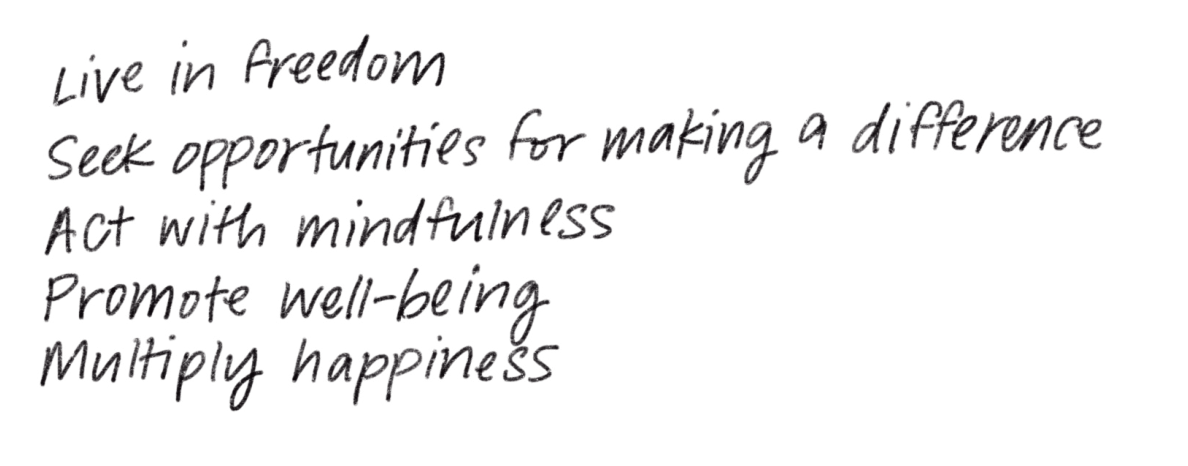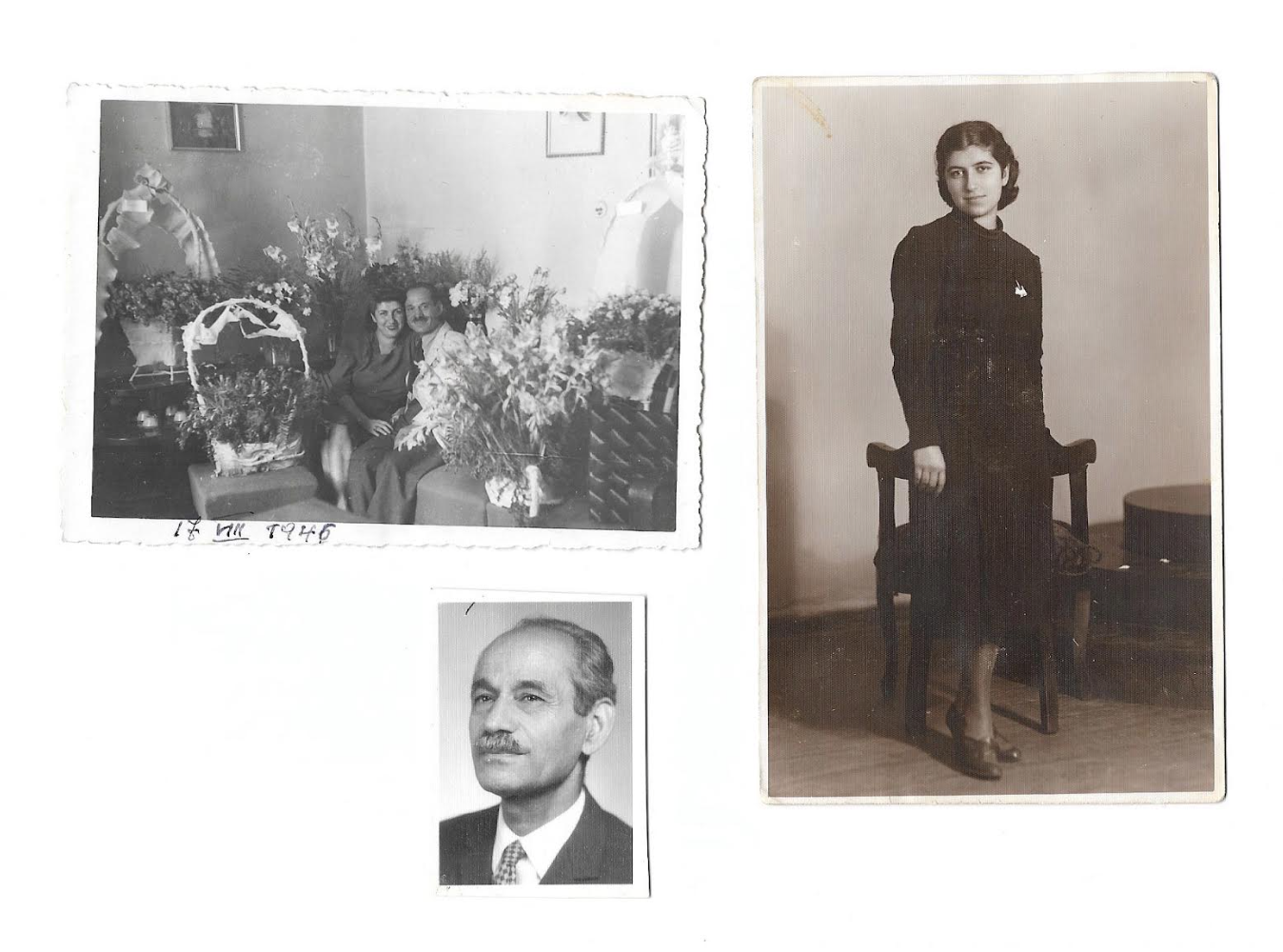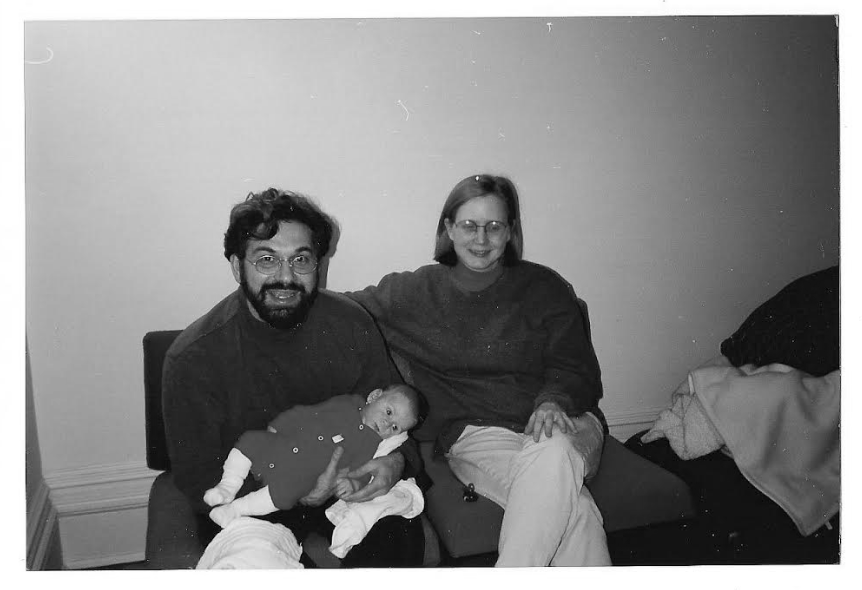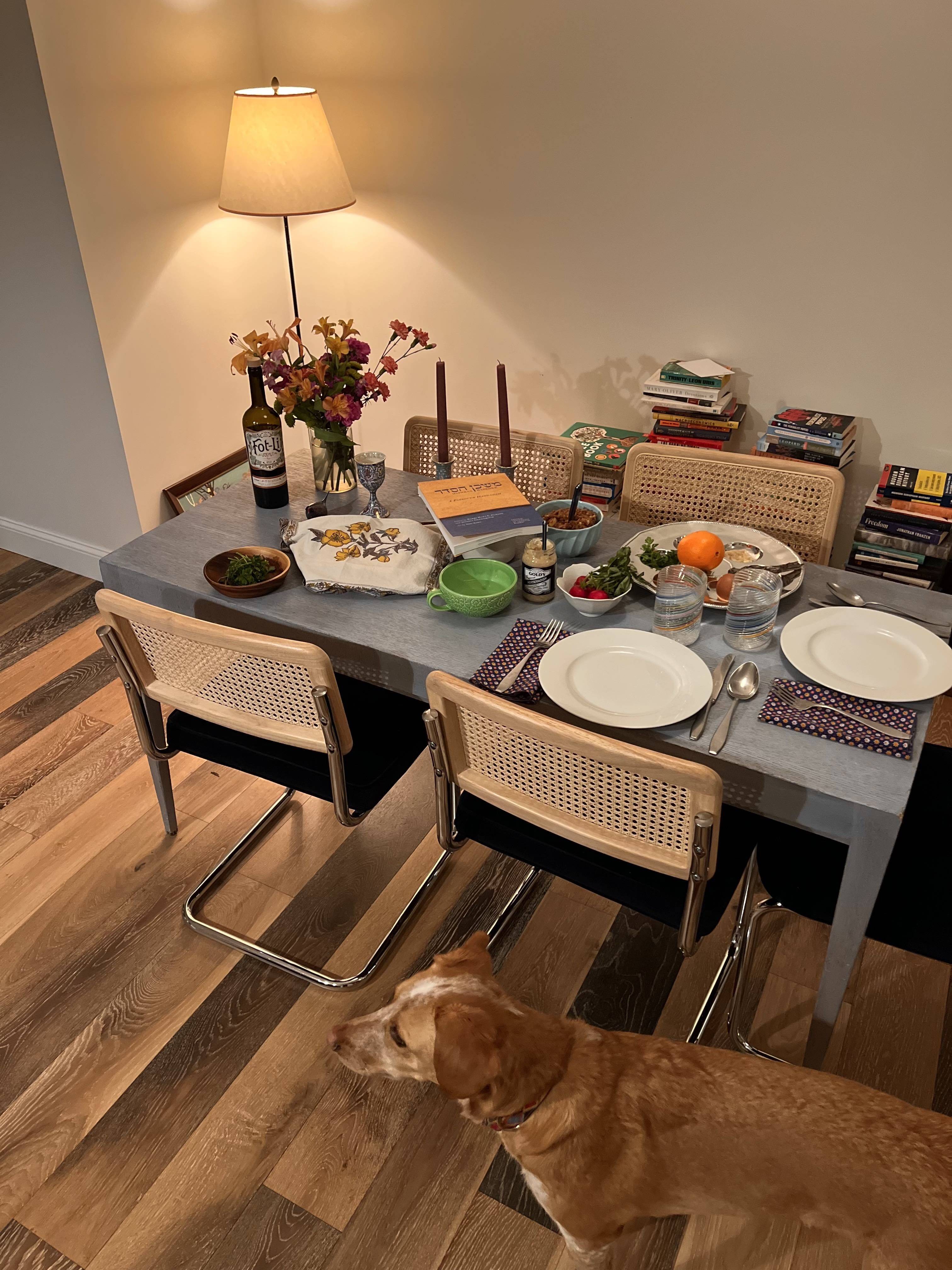Zoë Babian Klein: Building a Life of Reflection, Intention, And Connection Around Core Values
Zoë Babian Klein, Head of Product at The Grand
One of the most enriching experiences within my Grand group was a session focused on crafting our personal value statements. During this session, we infused action into our values by adding a verb to each one, allowing us to translate our values into actionable principles. For me, values have always represented the compass by which we navigate our lives.

From an early age, my education instilled in me a set of values that I've since embraced as my own: the Quaker values of simplicity, peace, integrity, community, equality, service, and stewardship. These values have guided me throughout my life, shaping my ethical framework. (As a side note, if you're not familiar with Quaker Pedagogy, I wholeheartedly recommend exploring it.) In my adult life, I became Jewish a year ago. Within Jewish tradition, I've found three core values that resonate deeply with me:
- The Obligation to Question: A fundamental tenet of Judaism is its non-dogmatic nature, encouraging critical thinking and the pursuit of knowledge through questioning.
- Tzedakah: This principle underscores the importance of making the world a fair and more just place, emphasizing the act of giving and helping those in need.
- Tikkun Olam: Judaism calls us to be active participants in repairing the world, striving to heal and improve society.
Notably, each of these Jewish values incorporates a verb, underscoring the importance of taking tangible actions to embody them. While my core values have remained steadfast throughout my life, what has evolved is how I've continued to align my life with them. It's worth noting that while my values originate in religion, I don't consider myself a religious person, and neither Quakerism nor Judaism holds a place in my family's historical background.
My father is of Armenian descent, and I am a first-generation American on his side. My grandparents' childhoods were marked by their harrowing escape from the Armenian genocide, a horrific campaign perpetrated by the Ottoman Empire in 1915. This genocide unfolded primarily through the mass murder of approximately one million Armenians, who were subjected to death marches into the Syrian Desert and the forced conversion to Islam, particularly among women and children.
Escaping the genocide as children, my grandparents ended up in Bulgaria, where their paths converged, leading to a fateful marriage years later. My father was born and raised in Bulgaria and grew up in a communist state. Due to the restrictions imposed by communism, our family was prohibited from practicing religion. Nevertheless, on New Year's Day (a time sufficiently distant from Christmas to avoid detection), my grandparents would covertly bring a Christmas tree into their home to celebrate a cherished holiday.

Under the communist regime in Bulgaria, my grandparents were also denied the right to operate their businesses or exercise autonomy in their professions. My grandfather, however, displayed remarkable entrepreneurial spirit and courageously started "unofficial" businesses. The stories of my grandparents' resilience and unwavering perseverance served as a source of inspiration throughout my childhood.
The narratives of my family's experiences in Armenia and Bulgaria resonated deeply with the Quaker philosophy I encountered during my childhood education and the Jewish values I have come to hold dear—particularly the concept of continually questioning the world around us. This process of inquiry serves as a foundation for contemplating how we can contribute to a more just world. In adulthood, I learned that my grandmother had endured torture at the hands of the communists while confined in a mental institution due to my grandparents' resistance. Their commitment to their values was unwavering, even in the face of such extreme adversity.
Because of my family's history, it has always been paramount for me to lead a life that aligns with my values. I have consistently pursued a career dedicated to effecting positive change in the world. I am privileged to have the ability to choose a career path that allows me to work towards making the world a better place. Right from the outset of my career, I have been fortunate to focus on areas such as education, technology, higher education, and career transitions. However, I had to be purposeful and deliberate in finding this fulfilling path, one that brings me immense happiness and allows me to contribute meaningfully to the betterment of society.

I attended a liberal arts college, and while I cherished my academic experience, I was plagued with anxiety about accumulating a substantial amount of debt. During my freshman year, I made the decision to transfer to a state school. At that time, I was uncertain about the career path I wanted to pursue. Unfortunately, the curriculum of my application-focused major felt disengaged from the real world. While it emphasized practicality, it lacked the critical thinking component required to deeply analyze problems and consider how we could apply our knowledge to solve them. I often found myself leaving class in frustration, on the brink of tears, feeling that I was not being challenged to think critically, and that my time was being squandered.
Simultaneously, I was working part-time at General Assembly before our Series A funding round, and I relished every moment of it. There, we were tackling real-world issues, assisting people in finding work they were passionate about, and dismantling the elitism that had once pervaded the industry. Countless General Assembly alumni had transformative experiences due to the accessibility of education we provided. My colleagues were deeply passionate about their work and committed to addressing systemic problems. My undergraduate experience stood in stark contrast. After much contemplation, I made the decision to commit to working full-time at General Assembly and postpone completing my bachelor's degree.
This marked my first experience of forging my own path and aligning my life with my values, rather than succumbing to societal expectations. Despite the skepticism from my family and friends, I was steadfast in my conviction that it was the right course for me. I attribute this confidence to the entrepreneurial spirit that I inherited from my grandparents — the determination and dedication to make things work, regardless of what others are doing or the circumstances surrounding you. Even though the conventional path involves spending four consecutive years in undergraduate education, I was resolute in my belief that I didn't need to conform to that norm.
In a similar vein, I don't identify as a religious person because religion often carries connotations of rigidity and blind adherence to a set of norms. For me, choosing to ascribe to Quaker values and choosing to practice Judaism and live a Jewish life feels like a very conscious choice, one done with a lot of critical thinking — not just blind faith.
In Quaker meetings, there's no designated leader. Everyone gathers facing each other in silent meditation. Should someone feel compelled to share a message, they can stand up and do so. In that moment, they become the leader, exemplifying the Quaker principle of equality: everyone has the capacity to lead. Practicing this since childhood instilled in me a comfort with silence, an ability to sit with my feelings and process them, and a greater willingness and openness to share about those feelings.

In my early twenties, I really missed the mindfulness elements of Quakerism, and I started going back to Quaker meetings, where I was able to build community in with very like-minded people. Community and giving back are Quaker tenets that remain central to my life. Whether it's our synagogue, or a local farm, or the trails we walk in Maine, my husband and I always try to donate to or volunteer for organizations that matter to us.
Lately, I have also been finding that religion is a great way to articulate my values and create a common way to talk about them with my family. Through Judaism, I've been able to reflect on my own family history in a way that Quakerism never gave me the tools to do. For example, Passover is one of my favorite Jewish holidays. When I first started going to Passover dinners, I recognized overlap between the Armenian genocide and the Exodus story of Egypt.
Every year Jews reflect and ask themselves on Passover: who are the Jews in Egypt today? Who are the people experiencing persecution that we should consider supporting and helping? That really tied into the Quaker values of community and equality and stewardship, but it also gave me a language to talk about my own family history that I'd never had before. In my experience with Quakerism, I was able to reflect and process my family's experiences, but my dad never had an opportunity like that. The Passover Seder was the first time my dad was able to really open up about his own experiences with his family history, which was so powerful.

When you get down to the essence of all these different experiences that mean so much to me — Quaker meeting, Passover Seder, or The Grand’s group coaching — you’ll notice that the core practices are similar:
- conscious and critical self reflection to identify core values
- intentional and active decision making to align your life with your core values
- sharing and being in community with people who share your core values
I continually strive to uphold these practices. I cherish that The Grand is yet another community that supports me in this endeavor and affords me the opportunity to foster these practices for others within The Grand community.